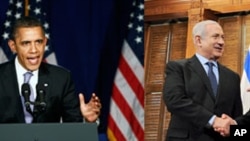President Barack Obama and Israeli Prime Minister Benjamin Netanyahu meet at the White House on Monday to discuss Iran. President Obama made his strongest comments yet about options regarding Iran amid ongoing intense global concerns about a possible pre-emptive Israeli military strike against Iranian nuclear sites.
Perhaps no meeting President Obama and Prime Minister Netanyahu have had over the past three years carried as much importance as the discussions Monday in the Oval Office.
Questions are many: With sanctions having major economic and other impacts on Iran, will Israel allow more time for pressure and diplomacy to work?
If Israel does strike Iran, how effective would the action be, with or without any possible U.S. support, in slowing Iran's nuclear development? How would the world deal with the negative effects sparked by a confrontation?
In an interview with Jeffrey Goldberg of The Atlantic published on Friday, President Obama cautioned against any “premature” Israeli action, saying it could allow Iran to “portray itself as a victim.”
But he said he believes the Israeli government recognizes that “as President of the United States, I don’t bluff” when it comes to his determination to prevent Iran from acquiring a nuclear weapon and repeated that all options are on the table.
Colin Kahl is Associate Professor at the Georgetown University School of Foreign Service and Senior Fellow at the Center for a New American Security.
He says Israel will do what is necessary to safeguard its security, but also needs to consider "blowback" for U.S. interests, including likely Iranian retaliation and the price of oil and the risk of dragging the United States into another war.
"An alliance runs in both ways. We are not going to tell the Israelis what to do, but we would hope I think that the Israelis would consider the effects that their actions could have on U.S. interests, their closest ally in the world, as they are making this cost-benefit calculation about whether to go to war," said Kahl.
The White House has kept to a carefully-worded script emphasizing success in "galvanizing" global support for unprecedented sanctions against Iran's financial and energy sectors, and the need to provide more "time and space" for a negotiated solution.
In remarks on Friday in Ottawa, Canada, Netanyahu said the international community should not fall into the trap of allowing Iran to use negotiations to gain time to advance its nuclear program.
This past week, the Chairman of the U.S. Joint Chiefs of Staff, Army General Martin Dempsey, who visited Israel in January, told U.S. lawmakers that he urged Israeli leaders to allow more time, but added military force remains an option.
"We have to decide what global pressure, including the use of force if and when necessary, can turn that regime away from its nuclear ambitions, its nuclear weapons ambition," Dempsey said.
Dalia Dassa Kaye, of the RAND Corporation, sums up what she calls a key dilemma facing the United States. "The dilemma for the U.S. is that of course the view in the region will certainly be that whether or not the U.S. was part of an attack, the U.S. will be implicated once the Israelis attack," said Kaye.
Israeli officials in Washington ahead of the Obama-Netanyahu talks include Defense Minister Ehud Barak, who is among those saying Israel might have to act before Iran enters a "zone of immunity" in which its nuclear sites would no longer be vulnerable to a pre-emptive strike.
Writing in the New York Times on Thursday a former chief of Israeli intelligence, Amos Yadlin, urged President Obama to provide an "ironclad assurance" that if Israel refrains from acting in its own window of opportunity, and all other options fail, the U.S. will act to prevent Iran from obtaining a nuclear weapon.
| Join the conversation on our social journalism site - Middle East Voices. Follow our Middle East reports on Twitter and discuss them on our Facebook page. |
